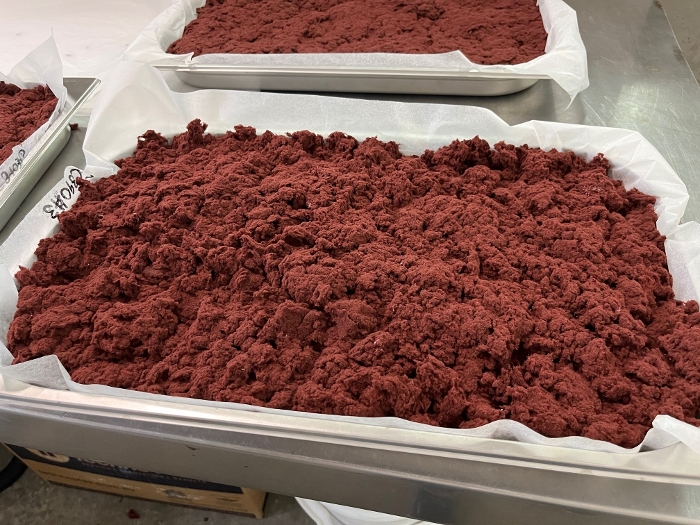

Whole Asparagopsis seaweed much more effective than bromoform alone in reducing cattle methane emissions, study finds

CH4 Global’s approach to methane reduction in cattle validated by peer-reviewed research. A new study has found that using whole Asparagopsis seaweed as a cattle feed additive is significantly more effective at reducing methane emissions than using bromoform, the aquatic plant’s primary active compound, on its own.
The study provides strong validation for the approach taken by CH4 Global, a company that is scaling commercial production and distribution of an Asparagopsis-based feed additive as a natural solution for shrinking the climate impact of cattle farming.
The peer-reviewed, in vitro study, published in Animal Feed Science and Technology, compared the methane reduction potential of whole Asparagopsis armata seaweed to pure bromoform when used as feed additives for cattle.
The results showed that the whole, dried seaweed reduced methane emissions by 95.6 per cent when included at 0.5 per cent of the diet, compared to a 59.6 per cent reduction from an equivalent dose of bromoform. This suggests that while bromoform is the primary active compound in Asparagopsis responsible for methane reduction, other bioactive compounds in the seaweed play a significant role, accounting for approximately 40 per cent of the total reduction effect.
“Our findings demonstrate the superior efficacy of whole Asparagopsis seaweed compared to isolated bromoform in mitigating methane emissions from cattle,” said Dr Eslam K. Ahmed of Obihiro University of Agriculture and Veterinary Medicine, Japan, the study’s lead researcher.
“This reinforces the value of harnessing the full spectrum of bioactive compounds naturally present in the seaweed to reduce enteric methane.”
CH4 Global’s flagship product, Methane TamerTM, uses whole dried Asparagopsis seaweed to sharply reduce enteric methane emissions in cattle.
CH4 Global CEO Steve Meller said the new study underscored the importance of the company's approach, particularly as beef and dairy producers considered different options – some of which relied solely on bromoform or synthetic chemicals – to shrink their carbon footprints.
“The results of this study have important implications as CH4 Global continues scaling Methane Tamer for our commercial partners,” Dr Meller said.
“Not only do they validate the performance advantage of whole natural Asparagopsis over synthetic compounds, but they also underscore the cost-effectiveness of our solution. Using whole Asparagopsis allows us to achieve superior methane reduction with a lower dose, making Methane Tamer an economically viable option for farmers.”
Methane is a potent greenhouse gas with more than 80 times the warming potential of carbon dioxide over a 20-year period. With livestock farming, particularly cattle and sheep production, responsible for at least 30 per cent of human-driven methane emissions globally, solutions like the one offered by CH4 Global are critical in the fight against climate change.
The full study, The anti-methanogenic efficacy of Asparagopsis armata: Could it be attributable solely to its bromoform content? is available at https://doi.org/10.1016/j.anifeedsci.2024.116118. The study was the result of collaborative research work between CH4 Global and Dr Ahmed’s laboratory.
Recent News
- Blog: Let’s get (a)political: all you need to know about elections and public relations
- The world’s most valuable dog toy revealed in the lead up to Guide Dogs Day
- Skytrax names Adelaide as best regional airport in Australia & Pacific region
- Indonesia AirAsia To Touch Down in Adelaide for the first time in June Fares on sale today starting from just AUD$199*!
- ‘Sleep hygiene’ stocktake critical for women in daylight savings change over
- United Airlines welcomed for South Australia’s first ever direct flights to US
- West Beach Trust appoints Elinor Walker to Board
- Local student Emaan Dewanyang wins Yugo Accommodation Support Scholarship with RMIT
- Blog: Why do so many companies fail the pub test in a crisis?
- Congratulations to our graduating and retiring Guide Dogs… and meet our new puppies!
- CH4 Global named one of TIME Magazine’s Top GreenTech Companies
- Flu cases in SA already up by 550 – experts warn get vaxed now
- Adelaide’s first purpose-built, affordable, long-term rental housing for women opens
- The world’s seaweed industry focuses on Adelaide at Seagriculture
- New Mount Barker Residential Development: A Feast for the Senses
- Blog: Be prepared - and be credible
- Visa Cash App Racing Bulls Announces Partnership with the Exclusive Student Housing Marketplace, Student.com
- CH4 Global and Mitsubishi Corporation partner to accelerate adoption of methane-reducing cattle feed supplement in Asia-Pacific markets
- Opinion Editorial by Brenton Cox, Adelaide Airport Managing Director - The Advertiser’s Future SA Campaign
- Adelaide’s most luxurious aged care site opens in an Australian first








